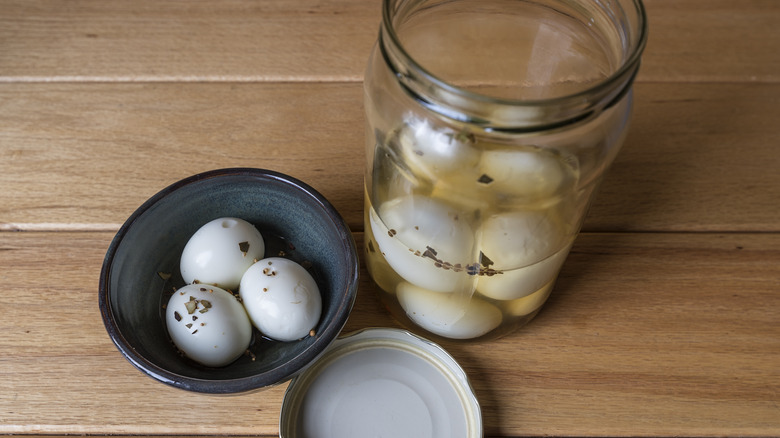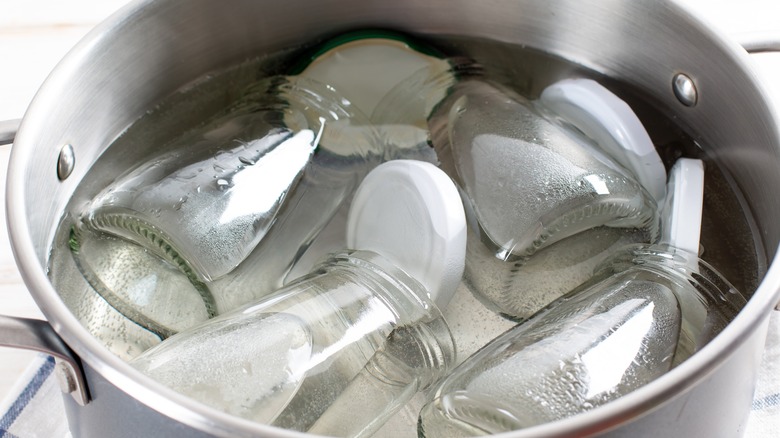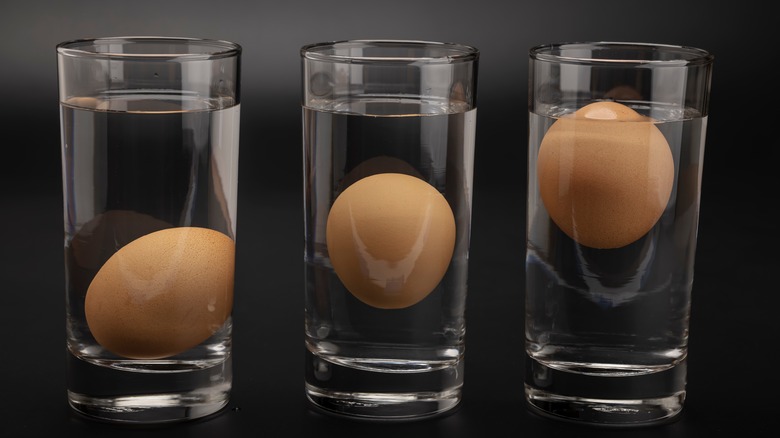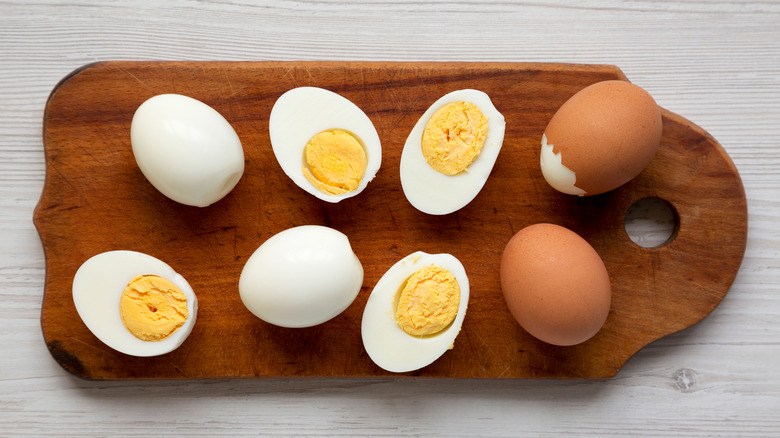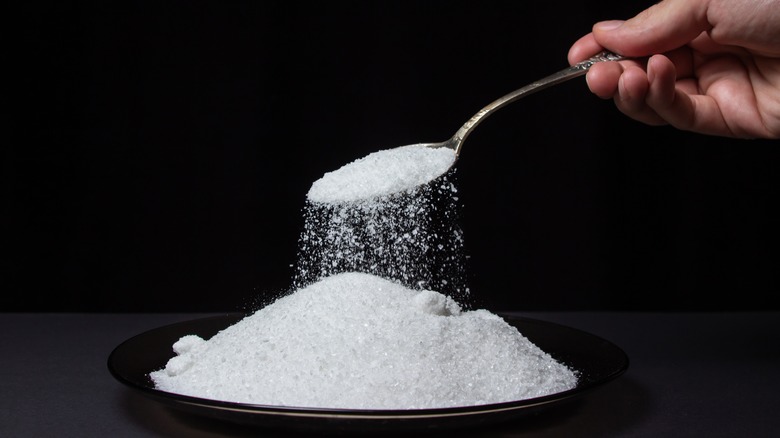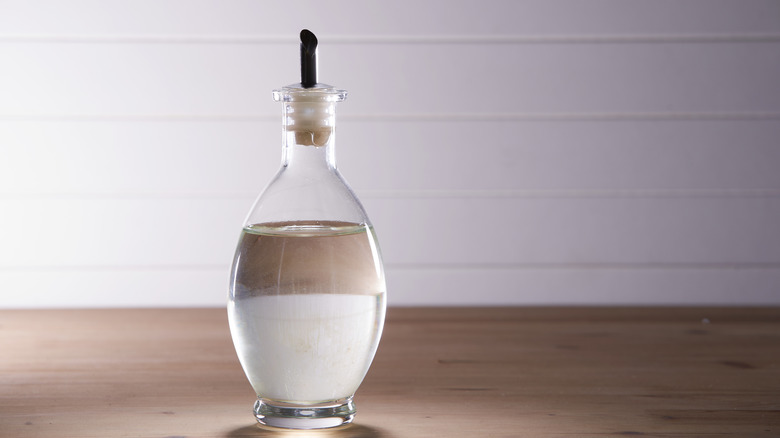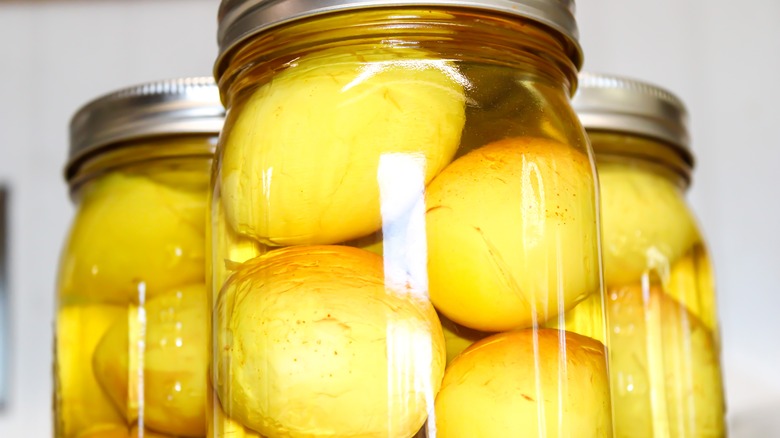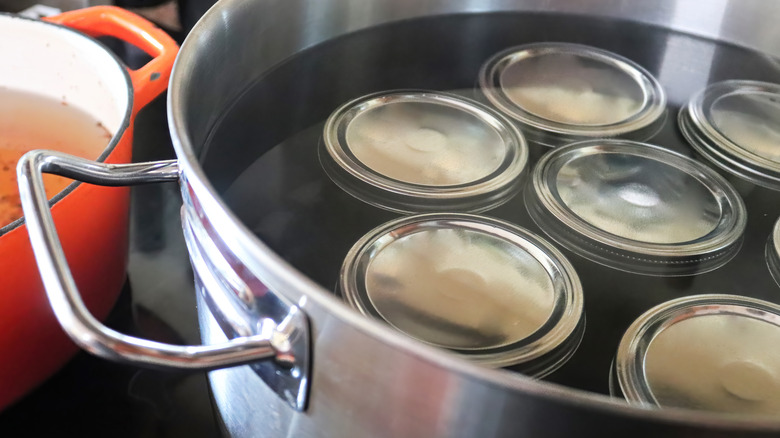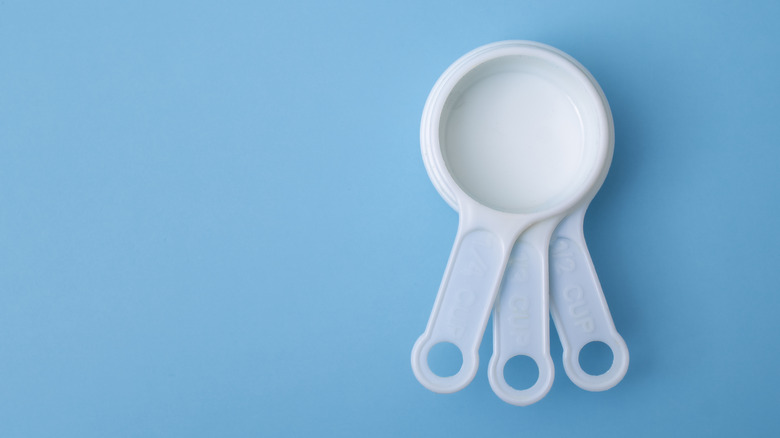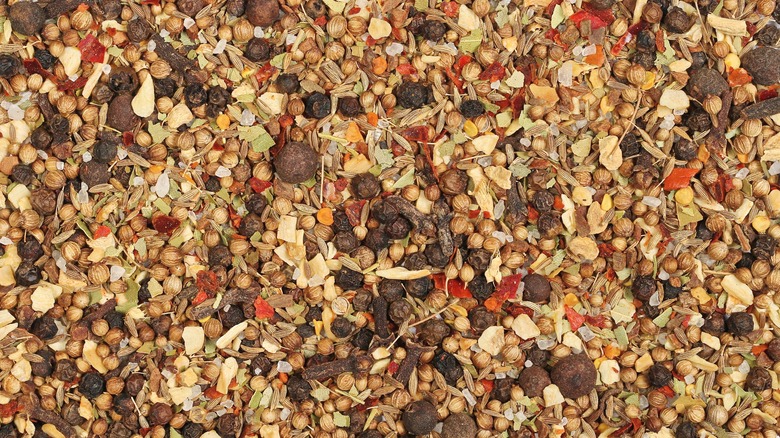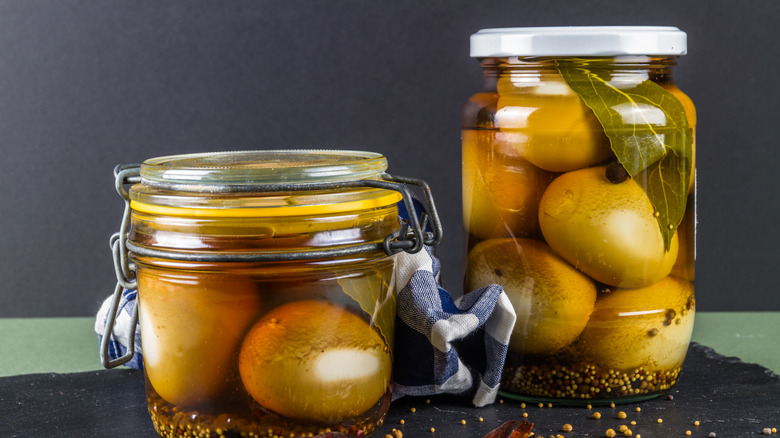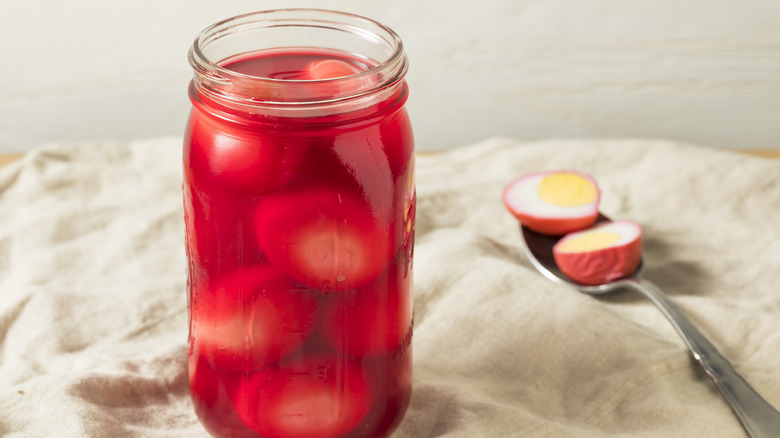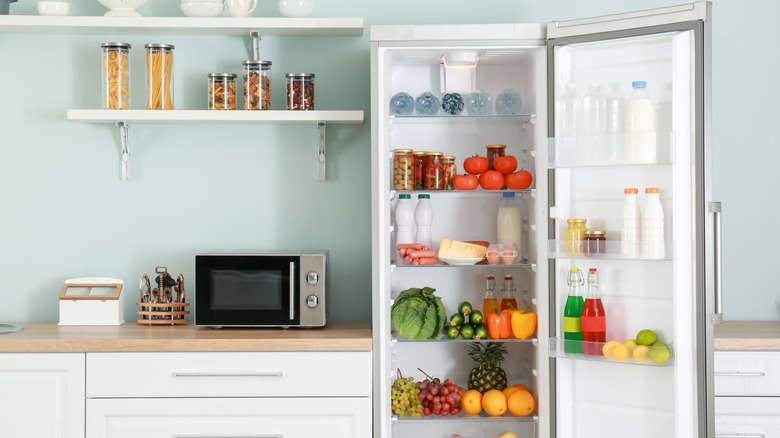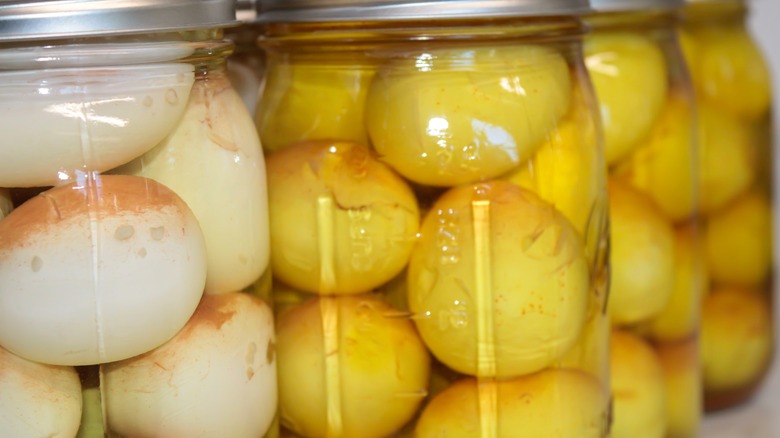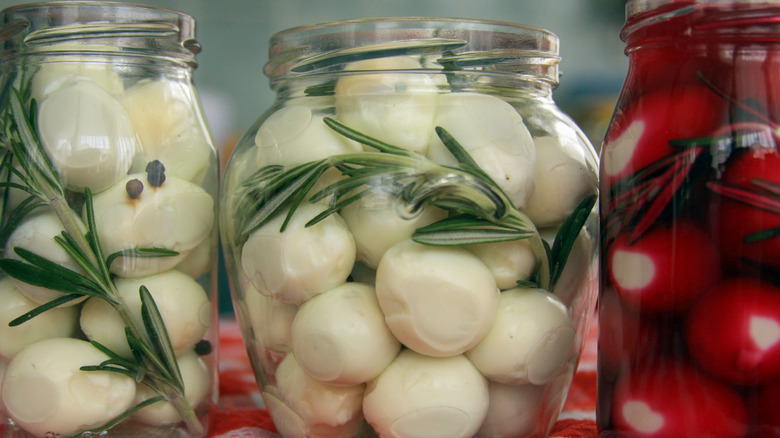The 14 Biggest Mistakes You're Making When Pickling Eggs
There's a pickle revolution happening, and everyone's along for the ride. While pickles in their various forms have been around for thousands of years, the food preparation and storage method has recently seen a renaissance. Lately, seemingly every menu has the sharp taste of pickled cucumbers, kimchi, or sauerkraut. Given that these pickled foods often have health benefits and unique tastes, we understand why people love them.
Although certain pickles are wildly popular, there's one pickled foodstuff we think is pretty underrated: pickled eggs. Made by soaking hardboiled eggs in brine, pickled eggs are more often seen in bars than on haute-cuisine menus. But they're a seriously tasty food, combining the creaminess of eggs with the sharpness of vinegar and salt and supplying nutrients like protein.
If you're feeling a little dubious about the dustiness of the pickled egg jar in your local dive bar, you can make them at home. If you know the right way to do it, that is. It's surprisingly easy to get pickled eggs wrong, and we thought it was about time to get rid of some common mistakes, once and for all.
Forgetting to sterilize your containers
When you're pickling, the jar or container you choose will house your pickles for several weeks or months. Proper preparation of them is essential, and it starts with sterilization. You need to sterilize jars for pickling, killing any bacteria lurking inside the containers. This also stops microbes from working their way into your pickling solution, which can cause foodborne illness.
As a general rule of thumb, if you're making pickled foods that you're keeping for longer than two weeks, you'll need to sterilize your containers thoroughly. Naturally, it's important to use heatproof jars for this process. Wash your jars with hot, soapy water. Rinse, and then submerge them in a large pot full of water. Boil the jars for ten minutes. Take them out to cool. Your lids may be slightly less heat-resistant: If that's the case, sterilize them by placing them in lightly simmering water for ten minutes. Then, allow them to cool, remove, and drain.
Using gone-off eggs
Given that pickled eggs are about, well, the eggs, you'll need a quality product. But it's all too easy to use an egg that's past its prime. However, it can be difficult to tell if an egg is bad, leading to an increased risk of resulting in an unsafe batch of food.
To start, it's useful to know how long eggs last in the fridge. Eggs are surprisingly resilient food items. Past their sell-by date, eggs are good to eat for up to a month. Keeping eggs in the refrigerator, particularly tucked in the coldest parts, will keep them fresh for longer. Leaving them out at room temperature, on the other hand, will cause them to perish more quickly.
If you wanted to check whether your eggs are still good, you'll need to place your eggs in a large bowl of water. When eggs float, it means they've gone bad. They've become buoyant because bacteria have produced gas inside the shell. If your egg sinks to the bottom, though, you should be good to go ahead and cook it.
Not cooking your eggs enough
There's a time and a place for a glorious, golden, runny egg yolk. But making pickled eggs is not one of them. Before making pickled eggs, it's important to make sure the eggs you're using are fully-cooked. Much of a pickled egg's appeal comes from the solidity of the hard egg yolk playing against the sharpness of the vinegar, sugar, salt, and pickling spices. If your egg yolk is still runny, though, the egg will fall apart into a vinegary, gooey disaster.
Although you may already know how to hard boil eggs, it's worth refreshing your memory on the method. To ensure eggs are fully cooked, cover them completely with cold water in a large pot. Don't place your eggs in already-boiling water, as they're more likely to crack. Slowly bring the water to a boil, and let them simmer for a minimum of nine minutes. Larger eggs will need a few minutes more to cook all the way. Then, remove your eggs, and place them into a cold water bath. This will halt the cooking process, and make the eggs easier to peel. Once cool, take your eggs out, crack the shell, and place them back into the water. Peel the eggs inside the water, which will work its way under the shell, making everything slip off easily.
Using the wrong type of salt
Pickling any food requires a perfect balance of salt and vinegar. But there can be a temptation to just throw any old salt you find into your jar, and hope for the best. Unfortunately, not all salt works in the same way: The type of salt you use can have a serious effect on the quality of your pickled eggs.
When pickling eggs, you should avoid using table salt. While iodized table salt can, in theory, pickle your foods as effectively as other salts, it can also contain additives that can change the color of your pickling mixture and pickled eggs. You may end up with a cloudy brine, which won't exactly make you excited to dive into the jar when you're hungry.
So what salt should you use? If you're serious about your pickling, you might want to invest in canning salt. Canning salt (or pickling salt) is specially formulated to remove any additives that could affect the taste or look of your pickled items. Kosher salt can also be a good option, provided that it has no additives.
Opting for the wrong vinegar
Since your pickled eggs are going to be living in a vinegar bath for the rest of their delicious lives, you want to find a fitting brand and type. But too many people assume that any type of vinegar can be used to make pickled eggs. At best, this leaves them with a product that's a little weird-tasting. At worst, they're totally inedible.
When making pickled eggs at home, you should ideally use all-purpose white vinegar. It might sound boring, but white vinegar has the most neutral flavor palette that you want as a base for a pickling brine. The additional flavor will come from all of the delicious spices you throw into the mix.
As a general rule of thumb, the bolder a vinegar's flavor is, the more it'll intrude on the taste of your eggs. Therefore, it's best to avoid using things like balsamic vinegar, which will just swamp the other flavors. Other specialized flavored kinds of vinegar will also likely be wasted on your pickled eggs. Leave those to your salad dressings.
Pickling eggs and vegetables in the same jar
If you're a big fan of pickles (and honestly, who isn't?), you might be thinking of ways to get more bang for your buck. If you're whipping up a batch of pickled eggs, it makes sense to throw your cucumbers, carrots, or whatever other vegetables you're using in there too. After all, that pickling brine has to be put to good use, right?
We highly recommend you keep them separate. Before pickling different items in the same jar it's important to remember that each item will pickle at a different rate. Some items are way more soft and porous and deteriorate faster. You can end up in a situation where your pickled eggs are done way after your other veggies: This may just render those vegetables too mushy.
There's also flavor to consider. Some vegetables, like onions, have a particularly pronounced taste, and this will bleed into your eggs. Conversely, eggs have a fairly bold flavor in their own right and could affect any vegetables you have tucked in there with them. It's far better to keep everything separate and enjoy the flavors of each item.
Not sealing your jars properly during pickling
So, you've prepared your pickled egg brine, perfectly cooked your eggs, and placed them lovingly into your jars. You've poured over the brine, making sure not to spill a drop, until it's at the perfect height. But then, you forget to tighten the lid! This rookie mistake can be a pickled egg killer.
If you don't seal your lid properly, you're leaving your prized pickled eggs at risk of being infiltrated by bacteria, specifically the potentially deadly clostridium botulinum. This can make your pickled items exceptionally risky. Aside from this, creating an improper seal also means that your pickled eggs will deteriorate faster: Pickling is most effective when no air can escape the jar.
This is also why many people say you should never reuse canning jar lids. Canning jar lids are intended to be used only once, and they're not as effective the second time around. The seal that's so effective at allowing air to escape can become faulty and bent out of shape. To play it safe, grab yourself a batch of new lids, so you can swap them out whenever you need.
Freestyling your measurements
There's an art to pickling. While you might fancy yourself as a bit of a kitchen pro, if you're not following a recipe and using appropriate equipment, you're setting yourself up for failure.
Freestyling your measurements can leave you with a strange-tasting result or poorly pickled eggs. To play it safe, follow a Classic Pickled Eggs Recipe. Remember that your ratio of vinegar to salt is important and avoid overpowering either ingredient into your mixture. Some recipes also call for cutting the pickling brine with water, which will remove some intensity.
Additionally, while you may be tempted to add in as many spices as possible, use them sparingly when you're first learning how to pickle eggs. For ten eggs, you may only need a few bay leaves, a couple of sprigs of herbs, and maybe some garlic. When it comes to the powerful taste of spices, a little goes a long way.
Forgetting about the spices
What makes pickled eggs so delicious? Is it the egg itself, the vinegar, or the spices that you add in? Well, the truth is, it's all of those things. But spices can often get relegated to the bottom of the list when we're making pickled eggs. It's a common error to leave them out, thinking that they'll be too overpowering.
In fact, the opposite is true. Pickling spice, a spice blend used in many pickle recipes, works to temper the acidity and harshness of the vinegar and salt. The spices add complexity and depth of flavor to your pickled eggs and stop them from being too bland. Generally, pickling spice has several key ingredients — mustard seeds, allspice berries, cloves, and bay leaves are often involved. Cardamom, peppercorns, and cinnamon are also commonly included.
Many pickling spice brands will include instructions as to how much you should use. Some brands proportion their spice blends into handy sachets or bags, so you can drop them right into your pickling brine. Don't forget to have a light hand with spices as you can always add more, but you can't take them out once their flavor has been added.
Trying to rush the cool-down process
The pickling process involves warming up your pickling jars to usher in the necessary changes in taste. But one fatal mistake involves trying to drop the temperature of the jars again as quickly as possible. As Healthy Canning states, it's essential to avoid the temptation to do so.
When you're warming up your pickled products, the heat kills off any bacteria present in the food. But some bacteria can remain once you've finished the water bath process. The gradual cool-down process allows that bacteria to be destroyed, further increasing the safety of your food. When you try and speed it up, you just make your food more likely to harbor microbes.
Instead, allow the cans to do their thing. After you turn the heat off, leave your jars in the hot water for five minutes or so. Leave them to cool somewhere that's consistently room temperature, with no breeze or drafts. Ideally, you should let your jars cool for a minimum of 12 hours. For best results, leave them to cool for a full day. Then, place them in the refrigerator.
Taking them out of the brine before they're done
When you make something delicious, it takes the patience of a saint not to eat it right away. With pickled eggs, this can be even more excruciating, partly because you have to wait a while before they're done. But whatever you do, don't dig in until they're done. Pickled eggs need a good amount of time to sit in their brine-y bath before they're ready to eat. If you don't leave them long enough, the flavors won't soak into the egg enough, and will just drip off the sides. You also increase the air getting to the eggs, which will heighten the chances of food spoilage.
For a premium pickled egg – full of vinegary, sharp deliciousness — give it at least eight hours to pickle. This is the minimum amount of time an egg will take to start properly take on the flavors. Ideally, you'll want to give them even longer. The best pickled eggs soak for several days before being eaten. Meanwhile, entertain yourself with other pickled foods. We promise the eggs will be worth the wait!
Storing them incorrectly
Once you make pickled eggs, you'll want to savor them. But if you're not storing them correctly, you could have to throw them out quickly. How you store your pickled eggs determines their shelf life. Direct sunlight, higher heat, and improper sealing will all affect how long your food lasts.
Pay attention to how you should store your pickles. It's advisable to keep your pickled eggs in the fridge, and only remove them to eat, says the National Center for Home Food Preservation. If you haven't yet opened your pickled eggs, it could be okay to keep them in a cool and dark pantry. Whenever you open the jar to take one out, make sure that the lid is screwed on as tightly as possible again. Remember, if you see any signs of spoilage, or smell anything particularly unusual, don't take chances on eating it — especially if you've been storing it in a warm place.
Assuming they'll last forever
There's a slight misconception out there that pickling foods will preserve them indefinitely. While pickling is a food preservation technique, nothing lasts forever. All pickles will eventually deteriorate, and preserved eggs also have a limited shelf-life.
Generally, you should eat your pickled eggs within three months. Later than that, the eggs will pose a health risk. It's important to know before making pickled eggs that, as with all foods, things can go wrong. Incorrectly preparing the eggs, or eating pickled eggs that are way past their lifespan, can lead to contracting food poisoning, specifically botulism. Although botulism infection is rare, it causes some severe symptoms, including difficulty breathing, fatigue, and vomiting (via the CDC). In the most serious cases, botulism is deadly.
Remember that the cooler the conditions your pickled eggs are kept in, the longer they'll last. If you have any concerns about the safety of your eggs, it's far better to just make a new batch.
Reusing your brine
If you've made a killer batch of pickled eggs, and you're nearing the bottom of the jar, you might be wondering what to do with the brine. It can be tempting to pour it into your next batch of eggs. After all, it worked so well the first time, so why not save on waste and reuse it?
Well, like all other foods, pickled egg juice is prone to deterioration. Once you've used it, it's better to throw it out and start anew. If you're not in the habit of wasting food (which we very much respect), you can also put your pickle juice to good use elsewhere. As Clemson Cooperative Extension Home & Garden Center states, pickled egg brine can be a good addition to coleslaw, or sauces that need a little extra zip. If you're making egg salad, adding in some pickled egg juice can also amp up the flavor. Try adding a tablespoon or two of pickle juice in place of vinegar. Remember, though, that if your brine shows any sign of spoilage, it should be thrown away immediately.
